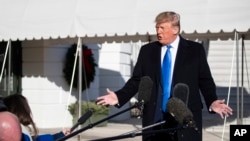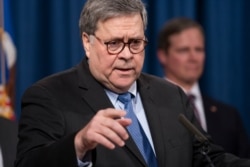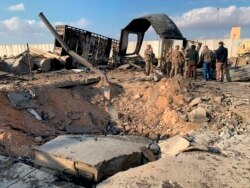U.S. Attorney General William Barr on Monday offered a vigorous defense of President Donald Trump’s decision to order a drone strike that killed top Iranian General Qassem Soleimani, saying Trump had the legal authority to act and that the question of whether Soleimani posed an imminent threat was a “red herring.”
I think when you’re dealing with a situation where you already have attacks underway, you know there is a campaign that involves repeated attacks on American targets, I don't think there is a requirement, frankly, of knowing the exact time and place of the next attack,” Barr said at a press conference at the Justice Department, where he announced the results of an FBI investigation into a deadly shooting at a Florida Naval base in December. “That certainly was the position of the Obama administration when it droned leaders of terrorist organizations.”
Barr, who is a proponent of sweeping presidential powers, has emerged as a staunch Trump defender against Democratic attacks since his appointment as attorney general less than a year ago.
He confirmed that the White House had consulted the Justice Department ahead of the Jan. 3 drone strike that killed Quds Force commander Soleimani and several others near Baghdad airport.
The strike led to an Iranian missile attack on two Iraqi air bases housing U.S. personnel five days later and raised the specter of a wider regional conflict. While the Trump administration has described the Soleimani strike as a defensive measure against impending Iranian attacks, Democrats and some Republicans say it was not justified because there was no imminent Iranian threat.
Barr called the killing of Soleimani a “legitimate act of self-defense,” saying the strike “disrupted ongoing attacks and re-established deterrence.” “
Frankly, I don’t think it was a close call,” Barr said in response to a question about the attack. “I believe the president clearly had the authority to act as he did on numerous different bases.”
Asked whether he had seen evidence of an imminent Iranian attack, Barr said, “I believe there was intelligence of an imminent attack. But I do believe this concept of imminence is something of a red herring.”
Barr’s remarks echoed comments made by Trump earlier Monday in which he dismissed as irrelevant questions about how imminent a threat Soleimani posed to American interests in the Middle East when Trump ordered his killing.
Trump offered no evidence supporting his claim that Soleimani was about to blow up four U.S. embassies, after key U.S. officials declined Sunday to say they had seen such a specific threat.
On Twitter, Trump said the mainstream U.S. news media and "their Democrat Partners are working hard to determine whether or not the future attack by terrorist Soleimani was 'imminent' or not, & was my team in agreement. The answer to both is a strong YES., but it doesn’t really matter because of his horrible past!"
He contended that opposition Democrats and the news media "are trying to make terrorist Soleimani into a wonderful guy, only because I did what should have been done for 20 years. Anything I do, whether it’s the economy, military, or anything else, will be scorned by the Radical Left, Do Nothing Democrats!"
On Sunday, Defense Secretary Mark Esper told CBS News' "Face the Nation," "I didn't see the intelligence about Iran posing an imminent threat to four U.S. embassies, but I believe President Trump when he says there was one."
The Pentagon chief added, "What I'm saying is, I share the president's view that probably - my expectation was they were going to go after our embassies."
Esper, in another interview, told CNN's "State of the Union" that he believed Soleimani was "days away" from launching an attack on U.S. facilities when the drone attack killed him Jan. 3.
Iran, in response, fired 16 ballistic missiles at bases in Iraq where U.S. troops are stationed, although the U.S. says it knew of the attacks hours ahead of time, allowing forces to bunker in safety. There were no reports of U.S. casualties.
In extensive Capitol Hill briefings on the Soleimani killing, lawmakers, including House Intelligence Committee chairman Adam Schiff, said Trump administration officials never mentioned the potential for attacks on the four embassies.
But U.S. national security adviser Robert O'Brien told "Fox News Sunday" "they can trust us on this intelligence" about the threat posed by Soleimani.
But he said it was "always difficult to know the specifics" of threats, saying they came from Soleimani and the Quds Force. He said there were "very significant threats to American facilities in the region," without acknowledging any specific threat to four embassies.
Speaker Nancy Pelosi, leader of the Democrat-controlled House of Representatives, told ABC's "This Week," "I don't think the administration has been straight with the Congress of the United States."
After Tehran fired the missiles at the U.S. forces in Iraq, Trump backed off earlier threats of further military attacks against Iran, instead imposing more economic sanctions against the Islamic Republic.
O'Brien said the U.S.'s "maximum pressure" campaign against Iran is working. "Iran is being choked off," he said, making it difficult for Tehran to "get the money" for continued funding for its Quds Force military operations in the Mideast.
The U.S. has expressed the view that its economic sanctions against Tehran will eventually force it to renegotiate the 2015 international treaty restraining Iran's nuclear program, the deal Trump withdrew the U.S. from.
But Trump, in a tweet late Sunday, seemed indifferent whether there are new negotiations with Tehran, saying, "Actually, I couldn’t care less if they negotiate. Will be totally up to them but, no nuclear weapons and 'don’t kill your protesters.'"
O'Brien said student protests in Tehran that started Saturday, after Iran admitted that it mistakenly shot down a Ukrainian passenger jet, killing all 176 aboard, in the hours after its attacks on the Iraqi bases, will also pressure Iranian leaders to renegotiate the nuclear treaty.






